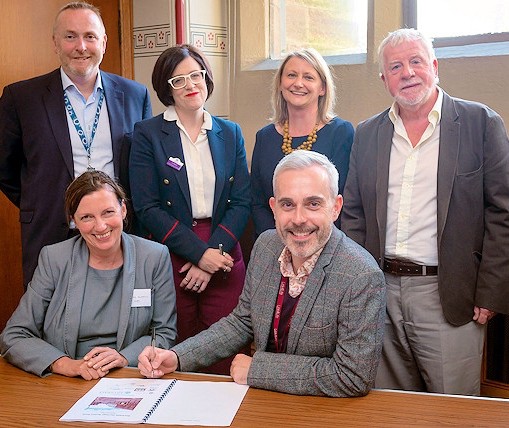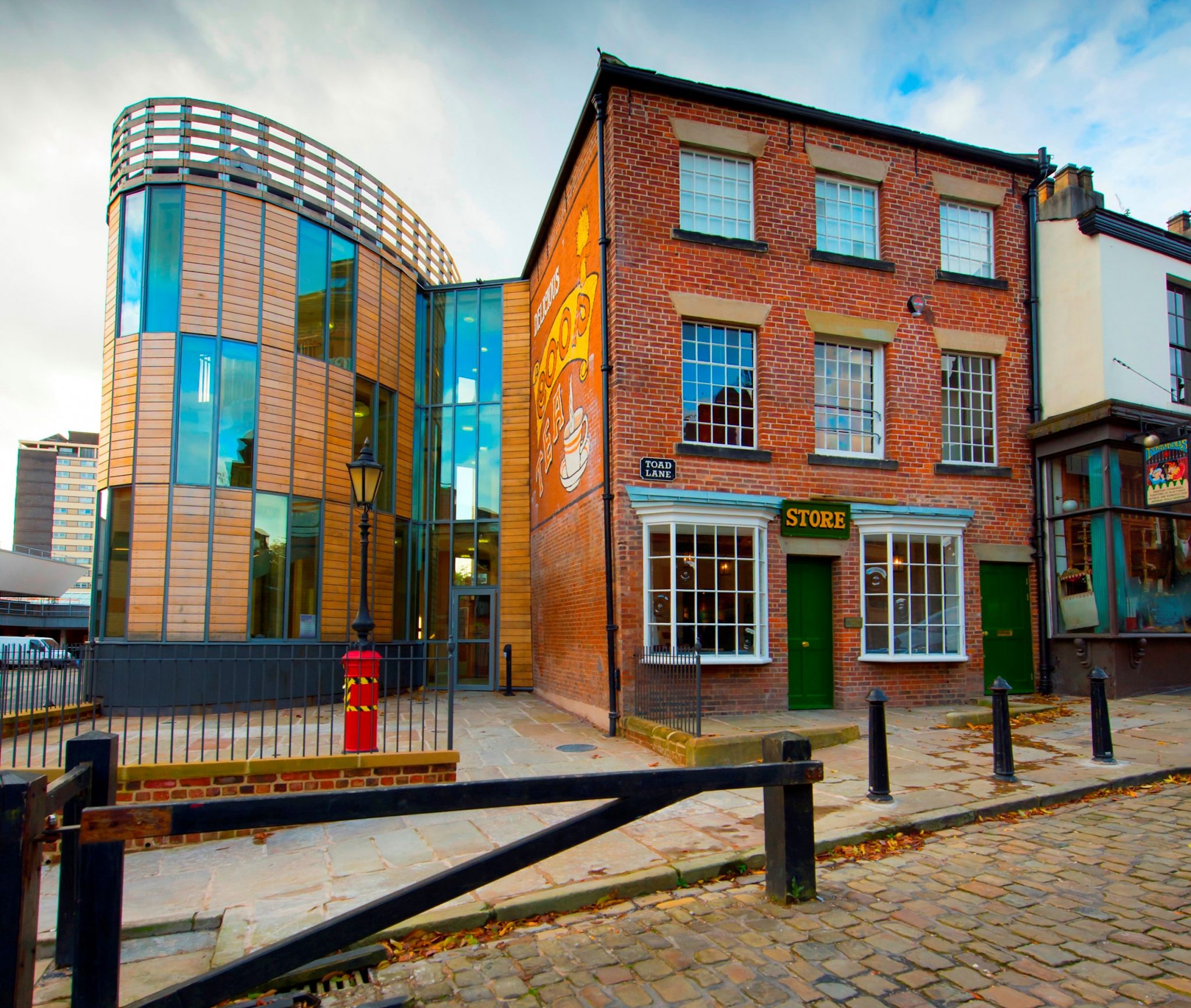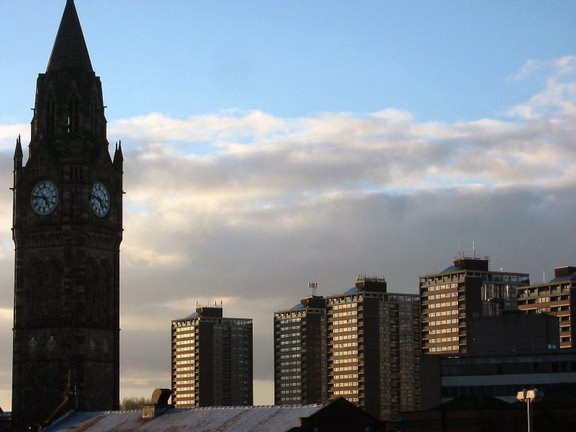Ever since it was set up in 2007, the Co-operative Heritage Trust has been working to safeguard the heritage of the UK co-operative movement. At the same time, the trust is bringing together local communities in Rochdale to learn more about their town’s key role in the birth of a business model that has changed lives around the world.
Co-operative Heritage Trust manager Liz McIvor says the trust, a registered charity, was established at a time when the co-operative movement was going through enormous changes. Founding members the Co-operative Group, the Co-operative College and Co-operatives UK wanted to ensure the movement retained and looked after important assets and documents.
This includes the building where the Pioneers commenced trading on 21 December 1844, which is now home to the Rochdale Pioneers Museum, and the National Co-operative Archive, which holds 200 years of co-operative records. The Co-operative College manages the Museum and Archive on behalf of the Trust.

In the 1980s, archive material was collected on an ad-hoc basis as and when items were donated to the Co-operative College or Co-operatives UK. After the 1990s, materials started to come in more regularly. At that time, the College ran its own library and collection of items, which it had inherited from the Co-operative Union (now Co-operatives UK).
“Most of the items people were interested in looking at were not text books but original records related to history of the movement. This formed the basis of the Archive,” says Ms McIvor.
“The charitable trust was formed to bring the Archive and Museum together and to present a more formalised approach to the wider public.”
Related: The Co-op College’s work, from Rochdale to Rwanda
Until then, people had to apply in advance to visit. The trust moved it to a more professional approach and brought the museum to industry standards.
Another important aspect of its work is raising awareness, says Ms McIvor. “There is less understanding among the wider public as to what a co-op is, why that matters, and why the history and heritage of this movement are important in the UK and abroad. That’s why it’s crucial for us to think about future planning for audiences as well as looking after the assets.”
The trust is in the process of becoming a charitable incorporated organisation, which means it can have a wider membership, and offer those members a voice in how it is run by becoming trustees.
As an independent charity, the trust also qualifies for public funding. In 2015 it successfully applied for funding through the Museum Resilience Fund, which enables museums to become more sustainable businesses.

This support helped it to compile a strategic development report, which included proposals to re-establish the museum and the work of the trust in Rochdale – taking it back to the movement’s roots by working more closely with local people.
As part of this process, the trust developed a community outreach programme to re-establish the museum as a venue and an option for people living in Rochdale, particularly those in deprived areas.
One of the programme’s most recent initiatives is a co-operative pop-in shop offering food and other essentials to local people living in poverty. The Pioneer Pantry is open on Friday afternoons and stocks a range of store cupboard essentials, along with fresh products and toiletries.
Related: Plans for a co-operative university to reshape UK education
Run as a member-owned co-op, the shop enables local people to pay £1 to join and take home a bag of food every week, paying what they can afford in subsequent weeks. In addition, the museum hosts monthly Friday night dinners, when cooked meals are offered to families living in poverty.
The project is also bringing new life to the story of the Rochdale Pioneers. Those coming to the shop get to learn about the history of the building as well as the basics of healthy eating, and join in with a wide range of community events.
“We were aware, though, that there was an audience that wasn’t featured: young people aged 12-25. It is a missing audience in terms of museum and galleries,” says Mr McIvor.
To address this issue, the trust designed a project for young people to learn about Rochdale and develop a sense of local belonging and identity.
With funding from the National Lottery Heritage Fund, the initiative will offer the chance to learn new skills such as community reporting and graphic design.
It will also offer lessons which put co-operative heritage in a wider context, prompting those taking part to look at why co-operation was – and remains – so important.
They will go on trips, carry out investigative reporting, and learn how to work as a group by reaching decisions democratically.
“Younger generations are more likely to understand ‘co-operation’ in terms of a word used in the workplace or in schools,” says Ms McIvor.
“It means working together, but they don’t have an understanding of the deeper meaning of what that is and why it is specific to where they come from.
“That’s what we’re looking to plug back into – to re-cement that idea: that it’s not just part of history, it’s something endemic to the way people lived in this part of the world. Not just Rochdale, but also Greater Manchester as a region”.
The project will run until 2019, with around 40 young people taking part. The trust hopes they will go on to become ambassadors and mentors for other young people.
Ms McIvor adds: “We want it to be interesting and for them to feel they know their region better at the end of the programme. We want to take them to places where some of these ideas have grown, and to see some good stories coming out as part of that.
“ We want to inspire them with co-operative news stories. They will be finding out about things that happened in the past.”
The funding environment for museums and galleries remains difficult. The Rochdale Pioneers Museum welcomes around 11,000 visitors a year, 60% of them from abroad. More local people are coming through the doors than in the past but raising awareness remains a priority in spite of the museum being free.
“We’re not selling an object, we’re selling an idea, the history of a concept. That concept is something people find hard to understand unless they had a personal connection with it,” says Ms McIvor.

She thinks that learning about co-operative heritage can play a key role in uniting communities, particularly diverse ones like Rochdale.
“In times of austerity, the usual tendency is to cut non-services that are seen as luxuries,” she adds. “But, actually, are they luxury? Is access to culture and understanding of identities a luxury or something we need?
“Heritage is a perfect example of an integrated experience, it’s something you could share. It doesn’t matter whether you are male or female, old or young, have different backgrounds or religions, there is a positivity of coming together and the solidarity of the movement is a positive framework to wrap yourself around.”
Rochdale is going through a major regeneration, with a new shopping centre due to open in 2020 and the high street being redeveloped. The trust is helping the local council to regenerate the town, focusing on its co-operative heritage.
“We want to feed those young people’s ideas, hopes dreams into those plans for regeneration. A newly regenerated Rochdale should have co-operation at the heart of it,” says Ms McIvor.
Like Rochdale, other cities across the UK have their own history of co-operation – not least Manchester, whose wealth owes a great deal to the co-op movement.
“In times of hardship identity can be polarised and make people less inclined to be open and engage with people they see as different,” she adds. “So it’s even more important to represent solidarity in a positive way.”